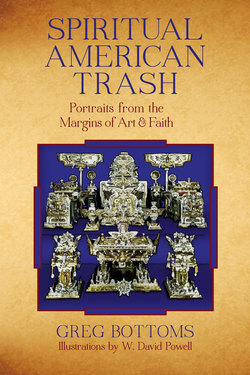Читать книгу Spiritual American Trash - Greg Bottoms - Страница 15
На сайте Литреса книга снята с продажи.
6.
Оглавление“And I saw a new heaven and a new earth: the first heaven and the first earth were passed away . . . ” (Revelation 21:1). He knew what that meant, knew the third heaven was the heaven of God, the second heaven was the heaven of the stars and the sun and the moon, and the first heaven, the doomed heaven spoken of in Revelation, was here, now. He was preparing.
He worked through the dark mornings, his joints and back tight as rusty hinges in the damp cold of the garage. Sometimes he’d stop to draw a quick sketch of a plan or to stare at what he was making.
He had built a stage in the back of the garage on which to set some of the pieces. On the larger objects he put rusty metal casters so he could move them to just the right spot. Everything was perfectly symmetrical, had to be, because Saint James was remaking time. That’s right, remaking time. Not just representing time as told in the Bible; he was replicating it with trash. You can see it if you look. On the right is the story of the Old Testament, of Moses and the Law; on the left is the history of Jesus and Grace, the way to salvation.
Saint James understood that the time of God, the only time, was cyclical, always returning. Nothing, no event, was pointless. Life repeated. It was right there in Ecclesiastes: “The sun also ariseth, and the sun goeth down, and hasteth to his place where he arose . . . The thing that hath been, it is that which shall be; and that which is done is that which shall be done.” Death simply meant rebirth and a new, more glorious life in heaven, where you would be reunited with all things lost, with Lee and your father and some of the men from the 385th who had died since the war. If you placed your faith in the Lord Jesus Christ, you would never, ever die. Your tears would be wiped away and forgotten. If you placed your faith in Jesus, it didn’t matter that you cleaned toilets and lived alone, that sometimes the people on your street scared you, called you a crazy fuck, a hermit, that sometimes the voices in your head called you things even worse, things you didn’t want to hear; and it didn’t matter that so many of the people you loved had vanished from the earth and your life and you could actually feel the empty spaces they left behind. None of it mattered. And if you truly believed, you were not just a poor man alone in the city among the poor, toiling in a poorly lit garage, babbling to a brick wall; you were not just a janitor, a forgotten vet scraping by on a paltry check. Your life mattered now and forever. Your life actually mattered.
He worked. He covered bottles and jelly jars and light bulbs with gold and silver foil, which he got from wine bottles and imported beer bottles and cigarette cartons and boxes of aluminum wrap. He used the tops of coffee cans for bases. He mounted upside-down drawers on cheap glass vases, wrapped them in foil. He trimmed the edges of a sawed-in-half table with government electrical cable before covering it all in gold foil. He used kraft paper and cardboard for angels’ wings, used carpet rolls to support the greatest weight. He used glue and nails and pins, and sometimes he encased an object in layers of foil until it was exactly the right size and shape.
And then there was The Throne itself, the centerpiece of the huge structure, an old red plush chair bought secondhand. He gave it gold wings and put it up high, a seat for the coming Savior. He gave it a high back—four feet, five feet?—of wooden shapes and smaller cardboard wings and bulbs of silver and gold. He named objects for saints and tacked his walls with biblical quotes and a picture of Lee, who was now, God told him, an angel living inside His body, God’s body as big as eternity—eternity itself. At the top of it all, this expanse that filled the entire back of a cold, damp garage at the end of a dark alley in one of the roughest neighborhoods in the city of Washington were the words FEAR NOT.
